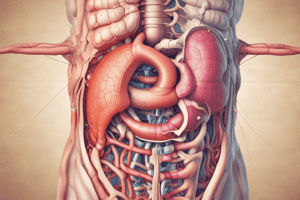Podcast
Questions and Answers
Which one of these is the correct definition of physiology?
Which one of these is the correct definition of physiology?
- The study of the nature of suffering
- The study of suffering
- The study of the physical (correct)
- The study of growth in pathology
Which one of these is the correct definition of pathology?
Which one of these is the correct definition of pathology?
- The study of the physical
- The study of suffering (correct)
- The study of growth in pathology
- The study of the nature of suffering
Which one of these is the correct definition of pathophysiology?
Which one of these is the correct definition of pathophysiology?
- The study of suffering
- The study of the development of disease
- The study of the nature of suffering (correct)
- The study of the physical
Which one of these is the correct definition of necrosis?
Which one of these is the correct definition of necrosis?
Which one of these is the correct definition of apoptosis?
Which one of these is the correct definition of apoptosis?
Which one of these is the correct statement about necrosis?
Which one of these is the correct statement about necrosis?
Which one of these is the correct statement about apoptosis?
Which one of these is the correct statement about apoptosis?
Which one of these is the correct statement about the etiology of cellular death?
Which one of these is the correct statement about the etiology of cellular death?
Which one of these is the correct statement about programmed cell death?
Which one of these is the correct statement about programmed cell death?
Which one of these is the correct statement about nuclear changes in necrosis?
Which one of these is the correct statement about nuclear changes in necrosis?
Which of the following is a key factor that can lead to apoptosis?
Which of the following is a key factor that can lead to apoptosis?
What is the role of BH3-only proteins in apoptosis?
What is the role of BH3-only proteins in apoptosis?
Which of the following can activate proapoptotic BH3-only proteins?
Which of the following can activate proapoptotic BH3-only proteins?
What is the main cause of apoptosis in viral infections?
What is the main cause of apoptosis in viral infections?
Which cellular response is associated with autophagy?
Which cellular response is associated with autophagy?
What is the role of the proteasome in cell injury?
What is the role of the proteasome in cell injury?
What is the main cause of oxidative stress?
What is the main cause of oxidative stress?
What is the result of hypoxia and ischemia on cellular function?
What is the result of hypoxia and ischemia on cellular function?
What is the consequence of ischemia-reperfusion injury?
What is the consequence of ischemia-reperfusion injury?
What are the late events in cell injury and necrosis from different causes?
What are the late events in cell injury and necrosis from different causes?
Flashcards are hidden until you start studying
Study Notes
Cell Death and Injury
-
Physiology: Study of normal functions and processes that occur within living organisms.
-
Pathology: Study of the nature of diseases, including their causes, mechanisms, and consequences.
-
Pathophysiology: Study of the changes that occur within the body as a result of disease.
-
Necrosis: Unprogrammed cell death resulting from external factors, such as inflammation, injury, or infection, leading to cell membrane rupture and release of cellular contents.
-
Apoptosis: Programmed cell death, a natural process in which cells self-destruct in a controlled manner, characterized by cell shrinkage, membrane blebbing, and chromatin condensation.
-
Necrosis: Characterized by cell swelling, rupture of the cell membrane, and inflammation.
-
Apoptosis: A regulated process that occurs in response to specific stimuli, such as DNA damage, growth factor withdrawal, or viral infections.
-
Etiology of cellular death: Can be caused by various factors, including genetic mutations, environmental toxins, and viral infections.
-
Programmed cell death: A natural process that eliminates damaged or unwanted cells, playing a crucial role in development, tissue homeostasis, and disease prevention.
-
Nuclear changes in necrosis: Characterized by karyolysis, pyknosis, or karyorrhexis, leading to the destruction of the nucleus.
-
Key factor that can lead to apoptosis: Activation of proapoptotic proteins, such as BAX or BAK.
-
Role of BH3-only proteins: Activate proapoptotic proteins, leading to the initiation of apoptosis.
-
Activation of proapoptotic BH3-only proteins: Can be triggered by various stimuli, including DNA damage, growth factor withdrawal, or viral infections.
-
Main cause of apoptosis in viral infections: Activation of proapoptotic proteins in response to viral infection.
-
Cellular response associated with autophagy: A catabolic process that involves the degradation of damaged or dysfunctional cellular components.
-
Role of the proteasome: A large protein complex that degrades damaged or misfolded proteins, playing a crucial role in protein quality control.
-
Main cause of oxidative stress: Imbalance between the production of reactive oxygen species (ROS) and the body's antioxidant defenses.
-
Effect of hypoxia and ischemia on cellular function: Decreased ATP production, leading to cellular dysfunction and injury.
-
Consequence of ischemia-reperfusion injury: Activation of oxidative stress, inflammation, and cell death.
-
Late events in cell injury and necrosis: Characterized by the activation of inflammatory responses, cellular infiltration, and tissue remodeling.
Studying That Suits You
Use AI to generate personalized quizzes and flashcards to suit your learning preferences.




